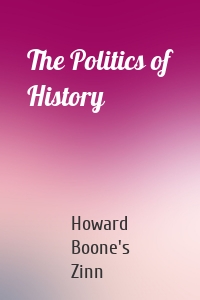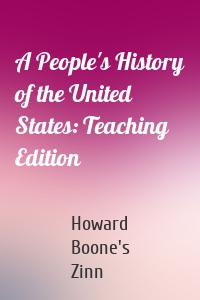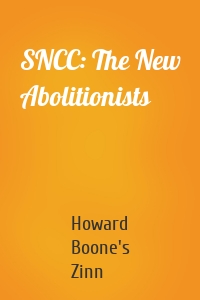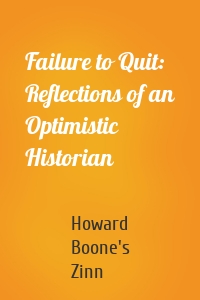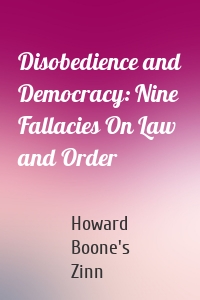Howard Boone's Zinn
8 кн.
Karl Marx In Soho: A Play On Histor...
The premise of this witty and insightful "play on history" is that Karl Marx has agitated with the authorities of the afterlife for a chance to clear his name. Through a bureaucratic error, though, Marx is sent to Soho in New York, rather than his old stomping ground in London, to make his case.<br><br>Zinn introduces us to Marx's wife, Jenny, his children, the anarchist Mikhail Bakunin, and a host of other characters.<br><br>Marx in Soho is a...
| Автор | Howard Boone's Zinn |
The Politics of History
This book presents a series of case studies and thought-provoking essays arguing for a radical approach to history and providing a revisionist interpretation of the historian's role. In a new introduction, the author responds to critics of his original work and comments further on the radicalization of history.
| Автор | Howard Boone's Zinn |
The Southern Mystique
Howard Zinn examines the politics of the South and his own experiences there. The South has long been surrounded in mystique. In this powerful volume, drawing on Zinn's own experiences teaching in the South and working within the Southern civil rights movement, Zinn challenges the stereotypes surrounding the South, race relations, and how change happens in history. With a new introduction from the author.
| Автор | Howard Boone's Zinn |
A People's History of the United St...
The Abridged Teaching Edition of A People's History of the United States has made Howard Zinn's original text available specifically for classroom use. With exercises and teaching materials to accompany each chapter, this edition spans American Beginnings, Reconstruction, the Civil War and through to the present, with new chapters on the Clinton Presidency, the 2000 elections, and the "War on Terrorism."
| Автор | Howard Boone's Zinn |
Post War America 1945-1971
Howard Zinn's unique take on this vital period in U.S. history with a new introduction. The postwar boom in the U.S. brought about massive changes in U.S. society and culture. In this accessible volume, historian Zinn offers a view from below on these vital years. By critically examining U.S. militarism abroad and racism at home, he raises challenging questions about this often romanticized period.
| Автор | Howard Boone's Zinn |
SNCC: The New Abolitionists
Howard Zinn tells the story of one of the most important political groups in American history. SNCC: The New Abolitionists influenced a generation of activists struggling for civil rights and seeking to learn from the successes and failures of those who built the fantastically influential Student Nonviolent Coordinating Committee. It is considered an indispensable study of the organization, of the 1960s, and of the process of social change. Includes a new introduction by the author.
| Автор | Howard Boone's Zinn |
Failure to Quit: Reflections of an...
A selection of Howard Zinn's most popular and accessible essays on history and politics. In this lively collection of essays, now with a new afterword, Zinn discusses a wide range of historical and political topics, from the role of the Supreme Court in U.S. history to the nature of higher education today.
| Автор | Howard Boone's Zinn |
Disobedience and Democracy: Nine Fa...
Howard Zinn's cogent defense of civil disobedience with a new introduction by the author. In this slim volume, Zinn lays out a clear and dynamic case for civil disobedience and protest, and challenges the dominant arguments against forms of protest that challenge the status quo. Zinn explores the politics of direct action, nonviolent civil disobedience, and strikes, and draws lessons for today.
| Автор | Howard Boone's Zinn |



